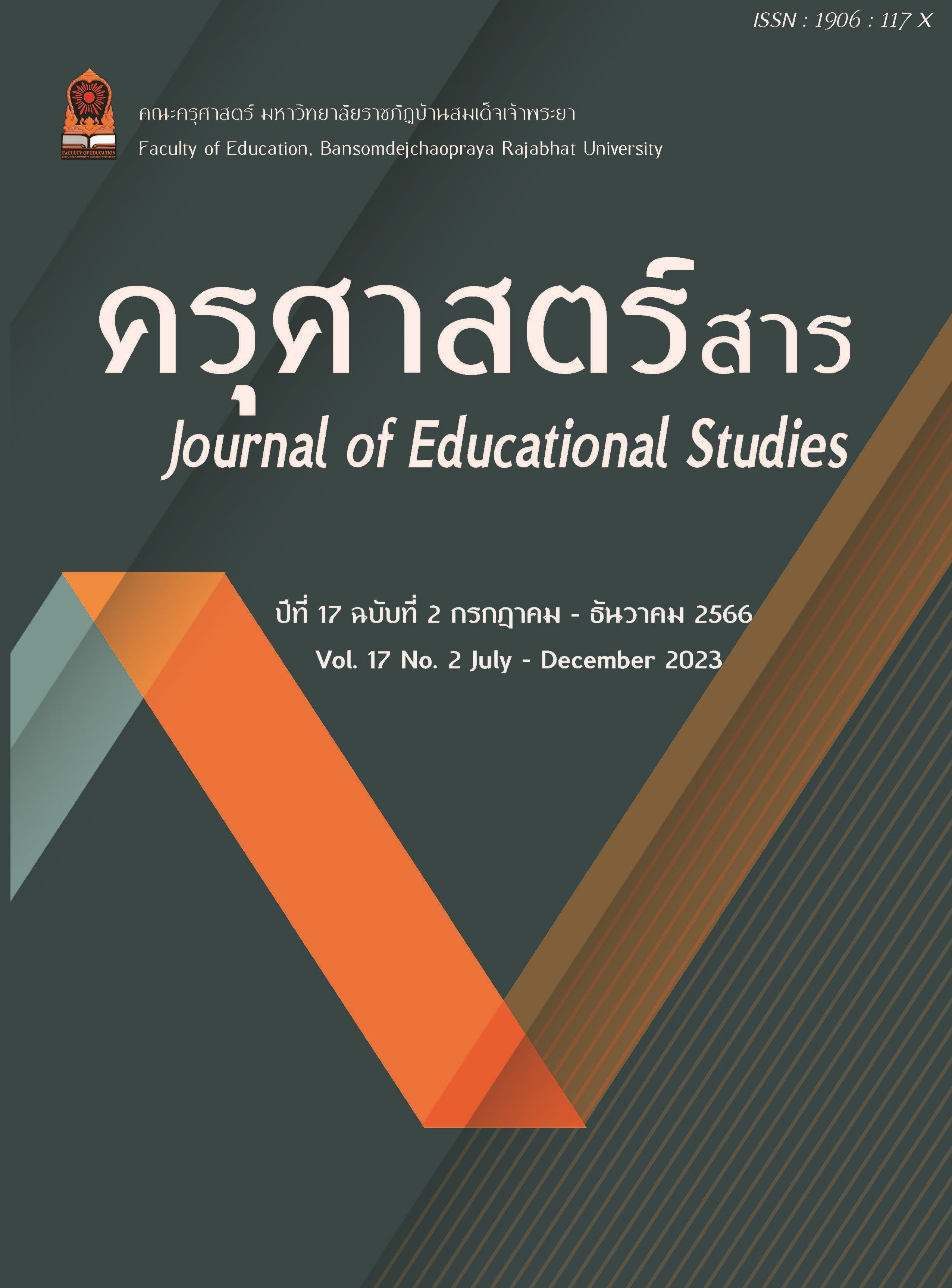วารสาร
การออกแบบเกมดิจิทัลเพื่อการเรียนรู้
สุรเชษฐ์ มีฤทธิ์
มหาวิทยาลัยราชภัฏบ้านสมเด็จเจ้าพระยา
จริยา วิชัยดิษฐ
มหาวิทยาลัยราชภัฏบ้านสมเด็จเจ้าพระยา
รวยทรัพย์ เดชชัยศรี
มหาวิทยาลัยราชภัฏบ้านสมเด็จเจ้าพระยา
หทัยรัก ตุงคะเสน
มหาวิทยาลัยราชภัฏบ้านสมเด็จเจ้าพระยา
บทคัดย่อ
เกมดิจิทัลเพื่อการเรียนรู้ (Digital Games Based Learning: DGBL) เป็นแอปพลิเคชันหรือโปรแกรมคอมพิวเตอร์ที่ออกแบบมาเพื่อส่งเสริมกระบวนการเรียนรู้และพัฒนาความรู้ของผู้เล่นเกม โดยใช้สื่อดิจิทัลและเทคโนโลยีในการนำเสนอเนื้อหาการเรียนรู้อย่างสร้างสรรค์ มีปฏิสัมพันธ์ และสนุกตื่นเต้น ส่วนที่สำคัญของเกมดิจิทัลเพื่อการเรียนรู้ คือการผสานกันอย่างกลมกลืนระหว่างเนื้อหาการเรียนรู้และฟังก์ชันของเกมเข้าด้วยกันจนทำให้เกิดประสิทธิภาพในการเรียนรู้ เกมดิจิทัลเพื่อการเรียนรู้ ได้กลายเป็นแนวทางการศึกษาที่โดดเด่น ซึ่งใช้ประโยชน์จากลักษณะการมีส่วนร่วมและการโต้ตอบ ปฏิสัมพันธ์ของผู้เล่นกับเกมดิจิทัลทั้งนี้เพื่อเพิ่มผลลัพธ์การเรียนรู้ บทความนี้มีวัตถุประสงค์ที่จะนำเสนอแนวคิด ประเภท กระบวนการออกแบบเกมดิจิทัลเพื่อการเรียนรู้ 6 ขั้นตอน คือ 1. กำหนดเป้าหมาย การเรียนรู้ 2. ศึกษากลุ่มเป้าหมาย 3. สร้างรายละเอียดในเนื้อหา 4. เลือกแพลตฟอร์ม 5. ออกแบบเกม 6. ทดสอบและปรับปรุง ทั้งนี้เพื่อสร้างความเข้าใจให้นักการศึกษา สามารถบูรณาการนำเอาลักษณะของเกมดิจิทัลมาใช้ในการออกแบบเกมดิจิทัลเพื่อการเรียนรู้ให้บรรลุวัตถุประสงค์การเรียนรู้ และส่งเสริมให้ผู้เรียนเกิดพฤติกรรมการมีส่วนร่วมกับการเรียนได้
Abstract
Digital Games Based Learning (DGBL) is an application or computer program designed to enhance the learning process and knowledge development of game players using digital media and technology to present learning content in a creative, interactive, and enjoyable manner. A key aspect of digital games-based learning is the seamless integration of learning content and game functionalities, resulting in effective learning outcomes. DGBL has emerged as an outstanding educational approach that leverages collaboration and interaction between players and digital games to enhance learning outcomes. This article aims to introduce the concept of six steps in the design process of digital games for learning. These steps include 1. Setting learning objectives 2. Identifying the target audience 3. Creating content details 4. Selecting the game platform 5. Game design 6. Testing and refinement The objective of these steps is to facilitate an understanding of how educational practitioners can incorporate the characteristics of digital games into the design of digital games for learning to achieve learning objectives and encourage learner engagement in the learning process.
คำสำคัญ
เกมดิจิทัลเพื่อการเรียนรู้, การออกแบบเกมดิจิทัลเพื่อการเรียนรู้
Keywords
Digital Games Based Learning, Digital Games Based Learning Design
เอกสารอ้างอิง
ปราวีณยา สุวรรณณัฐโชติ. (2561). สมรรถนะและบทบาทผู้สอนออนไลน์: การแสดงตนและสนับสนุนผู้เรียน. วารสารบัณฑิตศึกษา มหาวิทยาลัยราชภัฏวไลยอลงกรณ์ ในพระบรมราชูปถัมภ์, 12(2), น. 244-256.
ศูนย์พัฒนาและส่งเสริมการเรียนรู้ กระทรวงศึกษาธิการ. (2566). เกมส์แยกสี. การสร้างสีในโลก. กรุงเทพมหานคร: บริษัท อักษรศิลป์พาโนรามา จำกัด.
Amy Jo Kim. (2001). Gamification 101 : Design the player journey. Retrieved from https://www.slideshare.net/amyjokim/gamification-101-design-the-player-journey.
Deterding, S., Dixon, D., Khaled, R., & Nacke, L. E. (2011). From game design elements to gamefulness: defining "gamification". Proceedings of the 15th International Academic MindTrek Conference: Envisioning Future Media Environments. ACM. Retrieved from https://doi.org/10.1145/2181037.2181040.
Digital game-based learning (DGBL) model and development methodology for teaching history. Retrieved from https://www.academia.edu/78631847/Digital_Game_ Based_Learning_DGBL_Model_and_Development_Methodology_for_Teaching_History.
Erhel, S., & Jamet, E. (2013). Digital Game-Based Learning: Impact of Instructions and Feedback on Motivation and Learning Effectiveness. Computers and Education, 67, pp. 156-167. Retrieved from https://doi.org/10.1016/j.compedu.2013.02.019
Hamdi, L. F., Hantono, B. S., & Permanasari, A. E. (2022). Gamification Methods of Game‐Based Learning Applications in Medical Competence: A Systematic Literature Review. 2022 International Symposium on Information Technology and Digital Innovation (ISITDI 2022), Padang, Indonesia, pp. 50-54. Retrieved from https://ieeexplore.ieee.org/document/9944535
Hwang G.-J., Chiu L.-Y., & Chen C.-H. (2015). A contextual game-based learning approach to improving students' inquiry-based learning performance in social studies courses. Computers & Education, 81, pp. 13-25. Retrieved from https://dx.doi.org/10.1016/j.compedu.2014.09.006
Kengpol, A. (2018). The Thailand 4.0 Policy and Education Development. Procedia Computer Science, 139, pp. 258-265.
Lin, Y.-T. & Wang, T.-C. (2022). The Effects of Integrating Digital Board Game into Prime Factorization Learning on Elementary Students’ Flow Experience. 2022 International Conference on Advanced Learning Technologies (ICALT). Bucharest, Romania, pp. 122-124, doi: 10.1109/ICALT55010.2022.00044.
Nor Azan Mat Zin, Azizah Jaafar & Wong Seng Yue (2009). Digital Game-Based Learning (Dgbl) Model And Development Methodology For Teaching History. Wseas Transactions On Computers, 2(8), pp. 322-333.
Pablo Moreno-Ger, Daniel Burgos, Iván Martínez-Ortiz, José Luis Sierra & Baltasar Fernández-Manjón. (2008). Educational game design for online education. Comput. Hum. Behav., 24(6), pp. 2530-2540.
Prensky, M. (2001). Digital Game-based learning. New York: McGraw-Hill. Retrieved from https://www.researchgate.net/publication/30874037_Digital_Game-Based_Learning.
Suwannatthachote, P. & Pimdee, P. (2018). The Development of Education in the Era of Thailand 4.0. Journal of International Studies, 11(1), pp. 131-150.
Sarah Abu Bakar, S.N., Hafizah Mahamarowi, N., & Mustapha, S. (2022). Game-Based Learning as a Teaching and Learning Tool for Dyslexic Children. 2022 IEEE 10th Conference on Systems, Process & Control (ICSPC), pp. 50-55.
Whitton, N. (2010). Learning with Digital Games: A Practical Guide to Engaging Students in Higher Education. Retrieved from https://www.researchgate.net/publication/41125153_Learning_with_Digital_Games_A_Practical_Guide_to_Engaging_Students_in_Higher_Education
